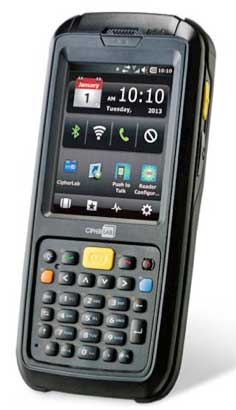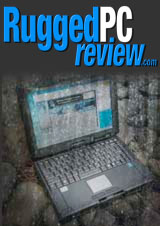On February 4, 2013, CipherLab introduced the CP60 Industrial Mobile Computer, which the company describes as a handheld solution to enhance productivity with cutting edge specifications for applications in harsh environments, such as transportation & logistics, warehousing, manufacturing and field service. CipherLab, which is headquartered in Taipei, Taiwan with offices in China, Germany and the USA, has been specializing in the design, manufacture, and marketing of Automatic Identification and Data Capture/Collection products and systems since 1988.

The CP60 is an interesting product insofar as it combines the look, size, feel, and software platform of a traditional/legacy industrial handheld with technology that is if not leading edge then at least up-to-date. Here's what we mean by that:
For size, looks are deceiving. While in the picture to the right the CP60 looks very small, it's not. The device measures 7.3 x 3.3 inches, is 1.7 inches thick, and weighs 18.2 ounces. That's quite a handful and also more than four times as heavy as a modern smartphone such as the iPhone 5. There's nothing wrong with the larger size and weight in a tool for the job, but potential customers need to be aware of it.
What's plainly obvious, on the other hand, is that the CP60 is designed in traditional industrial handheld style, with a physical numeric keypad for rapid data entry and a resistive touch screen. For an operating platform, the CP60 uses either Windows Embedded Handheld 6.5.3 or Windows CE 6.0 R3. These are essentially the final implementations of Microsoft's legacy mini OS before the company began experimenting with more contemporary and more smartphone-oriented OS software. As always, Windows Mobile is friendlier, more end-user oriented, and with a number of general apps, whereas Windows CE is more for projects where the devices will primarily run custom-developed software. Also of note: The pre-loaded CipherLab SmartShell enables custom user interface settings.
Note that CipherLab is quite aware of the rather significant different in look and feel between Windows Mobile and Windows CE: the CE version has a legacy QVGA (240 x 320 pixel) screen whereas the Windows Mobile model has full VGA (480 x 640 pixel) and can be ordered with either a numeric or a QWERTY keypad. Screen size, by the way, is 3.5 inches diagonal, i.e. the size that was standard for Pocket PCs and PDAs for many years.
On the processor side, the CP60 is quite modern for an industrial handheld, using the ARM Cortex-A8 based 1GHz DM3730 processor that also includes a PowerVR SGX graphics accelerator chip. The 3730 uses 45nm process technology, was designed by TI to deliver excellent ARM as well as graphics performance at very low power consumption, and it's fully compatible with the OMAP 3 architecture. There's 512MB of RAM and a 4GB of Flash, with onboard storage expandable through the unit's microSDHC card slot. Both RAM and storage are much more generous than what used to come with Windows CE/Mobile handhelds. The CP60 comes standard with a 3.7V/3,600mAH Li-Ion battery that's good for full-shift operation, and an even more powerful 4,400mAh extended battery is also available.
Contemporary technology is also used on the communications side in the form of 3.8G HSPA+, dual-band 802.11 a/b/g/n, Bluetooth V2.1, push-to-talk, and even a 4G LTE option. There's also integrated uBlox 6 GPS with "AssistNow" AGPS. The CP60's integrated camera is a 5-megapixel autofocus design. But while the CP60 has a USB port, it also supports legacy RS232 serial.
While virtually any smartphone can read barcodes via its camera these days, professional-grade scanning applications require a real 1D laser scanner, and CipherLab offers both a standard and an extended range laser as well as a 1D/2D imager.
The CP60 is also infinitely more rugged than any consumer smartphone. It can handle multiple 6-foot drops, is sealed to IP67 specifications (upgraded in Aoril 2013 from IP65) where the "6" means it's completely protected against dust, and the "7" that it is protected even against immersion into water up to one meter (3.3 feet). The operating temperature range is a very wide -4 to 122 degrees Fahrenheit. CipherLab also quotes a "tumble spec" where the devices survive 2000 one-meter (3.3 feet) tumbles. This makes the CP60 one of the toughest and most invulnerable industrial handhelds available today.
In industrial handhelds, the availability of accessories and peripherals matters. CipherLab offers optional charging and communication cradles, cables, belt holsters, as well as a pistol grip.
What does all that make the CipherLab CP60? A strong contender for any job that requires an industrial-quality handheld computer instead of just a more durable smartphone. The super-tough CP60 combines PDA, phone, data communication, GPS, and scanning into a single and compact (albeit rather large) Windows CE/Mobile handheld. Units such as this one practically last forever and they don't break, and customers will also be impressed CipherLab's comprehensive and high-quality documentation materials.
On June 4, 2013, Cipherlab announced that Push-to-talk functionality was now available for the CP60.
In August 2013, CipherLab posted a video showing all the ruggedness testing the CP60 is subjected to:



